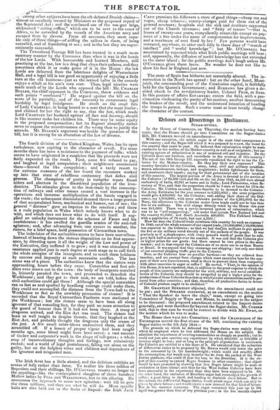The fourth division of the United Kingdom, Wales, has its
open turbulence, now aspiring to the character of revolt. For some months there has been a resistance to the payment of tolls ; which seems to have originated in a suspicion that the proceeds were not fairly expended on the roads. First, some few refused to pay, and laughed at legal compulsion ; their neighbours countenced them—braved the like compulsion ; and a tardy resort to the extreme measures of the law found the recusants worked up into that state of rebellious contumacy that defies civil process. The champions of purity in turnpike trusts found alders and abettors in the disordered population of the iron- districts. The stimulus given to the iron-trade by the consump- tion of railways and other means caused a vast increase in the operations and immense multiplication of the hands engaged in the trade ; the subsequent diminished demand threw a large portion of that accumulated force, mechanical and human, out of use; the general " distress" gave an impetus to the reaction ; and there is a rude population in Wales which nobody knows what to do with, and which does not know what to do with itself. It sup- plied an unlucky instrument for the schemes of FROST and his confederates : it has swelled the guerilla armies of the anti-toll agitators; and, after advancing from one excess to another, the rioters, for a brief space, held possession of Carmarthen town.
The indecision of the authorities seems to have been marvellous. Instead of bearing down the riotous disposition on its first appear- ance, by directing upon it all the weight of the Law and power of the Executive, they suffered it to grow ; and it was stimulated by resistance applied just in such degree at each stage as to call forth the whole energies of the insurgents, and to teach them boldness by success and impunity at each successive conflict. The last scene was of a piece. The authorities knew that the rioters were approaching, hours before they came. Constables and foot sol- diers were drawn out in the town : the body of insurgents marched in, leisurely paraded the town, and proceeded to demolish the Workhouse ; and they got to their task, we are told, before the civil authorities could get there Although the special constables ran as fast as zeal spurred by headlong courage could make them, they could not accomplish the distance from the Town-hall to the Workhouse so fast as the unwieldy procession of rioters! It is recorded that the Royal Carmarthen Fusileers were stationed at the Workhouse ; but the rioters seem to have been all along ignorant of that consoling fact, for they paid no more attention to the guard of honour than if it had not been there. A troop of dragoons arrived, and the Riot Act was read. The rioters had been so well taught to despise threats, that they laughed at the Riot Act, and probably thought the dragoons only the cream of the jest. A few smart sabre-blows undeceived them, and they scrambled off. If a lesson of proper vigour had been taught months ago, some blood might have been saved; a vast amount of timber and carpenter's work in the shape of toll-gates; a whole crop of insurrectionary thoughts and feelings, now extensively rooted; and a world of legal punishment, falling not alone on the guilty, but on the helpless wives and children and dependents of the ignorant and misguided men.


























 Previous page
Previous page